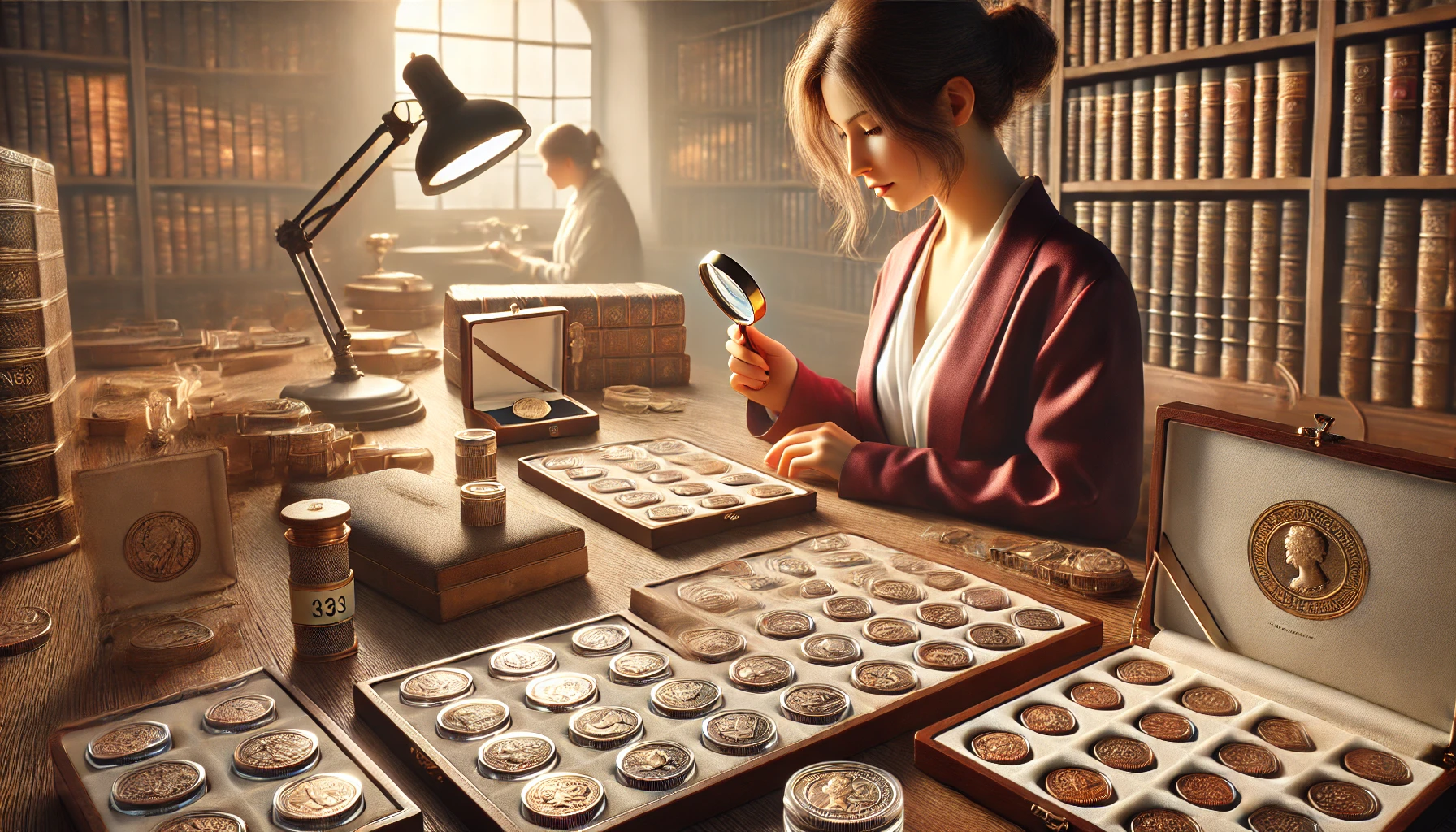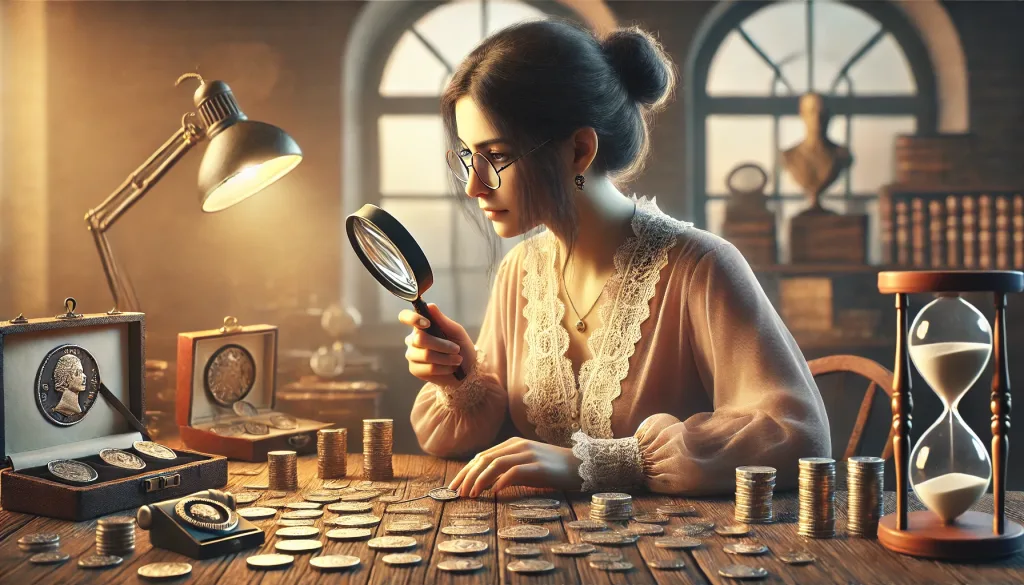
Collecting rare coins is a fascinating and rewarding hobby that connects enthusiasts with history, art, and culture. For beginners, the process of starting a collection may seem daunting, but with the right guidance, anyone can delve into this captivating world. This guide outlines the essential steps and insights to help novices embark on their journey of rare coin collecting.
Understanding the Basics of Coin Collecting
Before diving into coin collecting, it’s important to understand the fundamentals of this hobby. Coin collecting, also known as numismatics, involves acquiring and studying coins that hold historical, artistic, or intrinsic value. The value of a coin is often determined by its rarity, condition, and historical significance, making each piece in a collection a unique treasure. Additionally, many collectors find joy in researching the stories behind their coins, uncovering details about the time period or event they commemorate.
While some collectors focus on specific eras or types, others may prefer coins from various parts of the world. For instance, ancient coins from the Roman Empire or Greek city-states offer glimpses into ancient civilisations, while modern commemorative coins often celebrate milestones or cultural achievements. Knowing your interests and setting goals can significantly enhance your collecting experience, turning it into a deeply personal and satisfying pursuit.
Why Collect Coins?
Coins serve as tangible pieces of history, often reflecting significant events, cultural values, and artistic trends of their time. A single coin can reveal much about the economic conditions, technological advancements, or political changes of its era. For collectors, this blend of art and history creates a rich and engaging hobby. Additionally, coins can serve as a form of investment. Rare and well-preserved coins often appreciate in value over time, making them attractive to collectors seeking long-term returns.
Furthermore, the community aspect of coin collecting is equally appealing. Joining local numismatic societies or participating in online forums allows collectors to share knowledge, exchange coins, and build lasting friendships. This social element adds a new dimension to the hobby, fostering connections with like-minded individuals around the globe.
How to Begin Your Coin Collection
Starting a coin collection doesn’t require a large budget or extensive knowledge. However, it does demand a methodical approach to ensure your collection grows meaningfully over time. Collecting coins as a beginner can be a thrilling adventure, especially when you uncover hidden gems in unexpected places. Whether you’re buying coins at a flea market or inheriting a family collection, each addition to your collection has the potential to spark curiosity and pride.
Preparation and patience are key. Building a collection is a gradual process, and rushing to acquire coins without sufficient knowledge can lead to costly mistakes. Begin by researching the basics of coin collecting, understanding market trends, and setting realistic expectations. The more informed you are, the more rewarding your collecting journey will be.
Identify Your Focus
Consider what interests you most. Do you prefer ancient coins, modern commemoratives, or coins from a specific country? For instance, some collectors focus exclusively on British coins, appreciating their detailed craftsmanship and rich history. Others might be drawn to rare error coins, which are produced due to mistakes during the minting process. Having a clear focus will guide your purchases and research, preventing the collection from becoming overwhelming. Moreover, focusing on a specific niche can deepen your expertise and make your collection truly unique.
Set a Budget
Determine how much you are willing to spend on your new hobby. Rare coins can range from affordable pieces to highly expensive collectibles. Some coins, such as those made from precious metals like gold or silver, carry intrinsic value, while others are valuable for their historical or cultural significance. Sticking to a budget helps you prioritise and make informed decisions. Additionally, it prevents impulse purchases that might not align with your collecting goals.
Learn the Essentials
Educate yourself about coin grading, mint marks, and terminology. Books, online resources, and coin-collecting communities are invaluable for building your knowledge base. Coin grading, for instance, is a critical aspect of numismatics, as it determines the condition and, ultimately, the value of a coin. Understanding these aspects ensures you make wise purchasing decisions and avoid falling prey to counterfeit or overpriced coins. A good starting point is the Sheldon Coin Grading Scale, which categorises coins from poor to mint state.

Where to Find Rare Coins
Acquiring rare coins involves knowing where to look. As a beginner, explore various sources to expand your collection. Knowing the right places to search for coins can significantly influence the quality and authenticity of your collection. Additionally, understanding market dynamics, such as supply and demand, will help you negotiate better deals and make informed purchases.
It’s also essential to approach the acquisition process with caution. Always verify the credibility of sellers and ensure the authenticity of the coins you buy. Investing in counterfeit detection tools or consulting with experts can save you from costly mistakes.
Local Coin Dealers
Visit reputable coin dealers who can offer advice and authenticate coins. Establishing relationships with dealers ensures you have a reliable source for quality pieces. Local coin shops are also excellent places to gain insights about market trends and learn about upcoming auctions. These dealers often have extensive knowledge and can guide beginners in selecting coins that align with their interests and budgets.
Online Marketplaces
Platforms like eBay and specialised numismatic websites are popular among collectors. Always verify the seller’s credibility and ensure the coins come with detailed descriptions and images. While online shopping offers convenience and a vast selection, it also requires caution. Look for verified sellers and read customer reviews to ensure a positive buying experience. Additionally, many online platforms offer forums where collectors can exchange tips and discuss market trends.
Coin Shows and Auctions
Coin shows and auctions provide opportunities to see rare coins up close and interact with experts. These events are also excellent for networking with fellow collectors. Attending a coin show allows you to inspect coins in person, learn from seasoned collectors, and participate in educational workshops. Auctions, on the other hand, offer the thrill of competitive bidding, where you might acquire a coveted piece at a reasonable price. Keep an eye out for local events or larger exhibitions held by national numismatic organisations.
Embarking on a coin-collecting journey is an enriching experience that combines education, history, and personal satisfaction. By following these steps and continually learning, you’ll not only build a meaningful collection but also become a part of a passionate and welcoming community. Whether you aim to preserve history, appreciate artistry, or invest in rare items, coin collecting is a rewarding pursuit that offers endless opportunities for discovery.